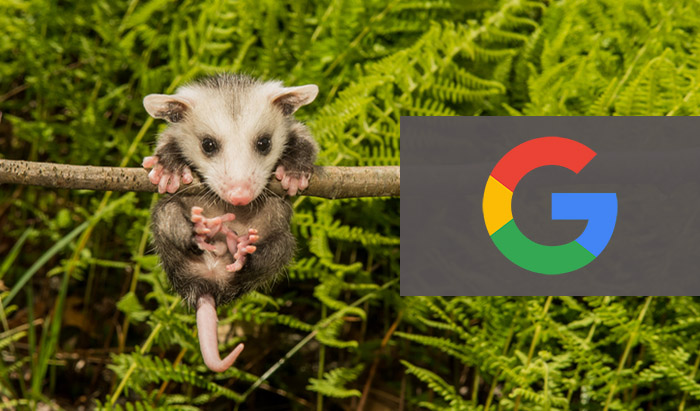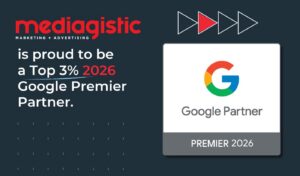
Google’s “Possum” Update and How it Impacts Your Local SEO

For the past few months, Mediagistic’s local search team has been monitoring a huge local algorithm change that Google rolled out at the beginning of September. Nicknamed “Possum” by the local SEO community, it was the largest update to local search results since Pigeon was introduced in 2014. In fact, data has been showing that this change has affected more than 60 percent of search engine results pages (SERPs).
If you’re running an SMB with a brick-and-mortar retail presence or a defined service area, it’s important to understand how some of the basics of Possum work. Read on to learn how this local search update works and what it means for your business.
What Has Changed for Local Results?
Believe it or not, Google’s possum update made local search results even more location-specific than they already were. The new local SERPs aren’t focused on only listing businesses that have a large presence and domain authority, but rather, they’re more aligned around proximity and relevance. Here are three of the largest changes:
Change 1: Addresses outside of city limits have a chance for more exposure.
Previously, companies that didn’t have an address within the city struggled to break into the results. If someone searched for “Atlanta HVAC company” or “plumbers in Atlanta,” for example, the results would skew heavily toward companies located in the downtown area, while ignoring those in surrounding suburban areas and unincorporated areas. Considering Atlanta is a vast metropolitan area, it’s unlikely that most searchers wanted someone directly in the city center.
Change 2: Multiple listings under the same address are getting filtered out.
When Google sees multiple listings pointing to the same address, it’s going to start listing one and filtering out the rest. For example, consider a firm or practice that employs multiple doctors, lawyers, or real estate agents who have all listed themselves as separate entities in Google My Business. Under Possum, instead of showing all agents from the firm, only one will be listed. Again, this change favors the customer because it adds clarity and relevance to the search results instead of filling the local search pack with duplicate results.
Change 3: The searcher’s location is more important than ever.
Instead of showing all the places within an area, Google is trying to show the best locations for that particular customer. So if a customer searches for Chinese food, the local search pack’s results are going to be closer to their actual location, instead of highlighting Chinese restaurants across town.
What Google Possum Means for SMBs’ Local SEO
While most Google updates make businesses nervous, this is actually great news for companies that rely on local communities to stay in business. First, by improving the results on a neighborhood level and extending the results beyond city limits, more companies have a chance to show in search results. Next, the results will be better for customers, which means they will spend less time researching until they find the company they’re looking for.
For example, let’s say a local contractor has a business just outside of city limits in a heavily residential area. Previously, the results would show contractors all over the city — and especially those downtown. This meant he would drive across town for a job while competing with others city-wide. By improving the local results, the contractor can show up within the neighborhood more often, which reduces competition and creates more opportunities to grow his name within the community.
Local Search Solutions for Small- and Medium-Sized Businesses
As Google’s approach to local search continues to grow in sophistication, so too will the complexity of its algorithm. Although these changes probably will always favor the user, keeping track of them will increasingly become a major challenge for local businesses.
If you’re worried about how Google’s local search algorithm changes might affect your business, or want to take advantage of these changes to grow your company’s local search presence, contact Mediagistic today to learn more about our internet marketing programs. We specialize in local SEO, and we’ve helped hundreds of companies grow by helping them connect with real, relevant customers in their respective service areas.
Krystina Lisi is s Local Search Strategist at Mediagistic. She’s an Internet enthusiast with a passion for Google Maps, YouTube, and Social Media. She also is an amateur photographer and Netflix binge-watcher who enjoys 90s sitcoms and sketch comedy. Connect with her on LinkedIn or follow her on Twitter @krystinalisi.
Image via Thinkstock
You May Also Like

Mediagistic Earns 2026 Google Premier Partner Status, Ranking Among the Top 3% of Agencies Nationwide
February 24, 2026Mediagistic is proud to announce that we have once again earned Google Premier Partner status for 2026. This distinction places us among… Continue Reading Mediagistic Earns 2026 Google Premier Partner Status, Ranking Among the Top 3% of Agencies Nationwide…

EPIC 2026 Recap: What Getting 1% Better Means for HVAC Marketing in 2026
February 19, 2026The Main Event of HVAC delivered exactly what the industry needed. At EGIA’s EPIC 2026, contractors, distributors, and partners from across the… Continue Reading EPIC 2026 Recap: What Getting 1% Better Means for HVAC Marketing in 2026…

HVAC Marketing in 2026: Industry Data, Trends & Growth Benchmarks for Contractors [Infographic]
February 1, 2026HVAC is picking up again in 2026, but competition is getting tougher. Costs are rising, and more companies are fighting for the… Continue Reading HVAC Marketing in 2026: Industry Data, Trends & Growth Benchmarks for Contractors [Infographic]…